

Why You Should Never Start an Ebay Store. If you are going to take your online store seriously, you need to register your own domain and implement your own website.
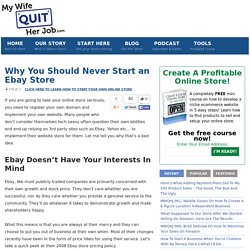
Many people who don’t consider themselves tech saavy often question their own abilities and end up relying on 3rd party sites such as Ebay, Yahoo etc… to implement their website store for them. Let me tell you why that’s a bad idea. Ebay Doesn’t Have Your Interests In Mind Ebay, like most publicly traded companies are primarily concerned with their own growth and stock price. They don’t care whether you are successful, nor do they care whether you provide a genuine service to the community. If you were to open a store on Ebay, Ebay would take between 8-12 percent of your gross sales. Ebay Stores Don’t Provide Design Flexibility Unless you feel like paying hundreds of dollars a month, Ebay greatly limits what you can do with your Ebay storefront.
Ebay Shoppers are Inherently Cheap When I shop on Ebay, I shop for bargains. Still Afraid to Open Your Own Store? Why we abandoned Amazon and eBay. In business, you must always be on the lookout for so-called Black Swan events.
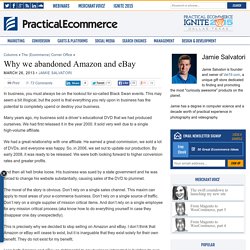
This may seem a bit illogical, but the point is that everything you rely upon in business has the potential to completely upend or destroy your business. Many years ago, my business sold a driver’s educational DVD that we had produced ourselves. We had first released it in the year 2000. It sold very well due to a single high-volume affiliate. We had a great relationship with one affiliate. And then all hell broke loose. The moral of the story is obvious. Pros and Cons of Selling on Amazon, eBay and Etsy. Today's ecommerce business owner has more options than ever when it comes to where (and how) to sell goods online.

You can open a standalone ecommerce site using a number of relatively inexpensive ecommerce platforms (shopping carts), many of which now include marketing tools. Or you can set up shop on one of the many established online marketplaces, namely eBay, Amazon or Etsy. [ Related: 11 Common Ecommerce Mistakes -- and How to Fix Them ] So which option -- standalone or marketplace, or both -- is best for your ecommerce business? Dozens of ecommerce business owners share a list of the major advantages and disadvantages of selling via Amazon, eBay, Etsy and/or your own ecommerce site -- and why it can make sense (as well as dollars) to have a presence on both. [Note: Almost everyone interviewed had a standalone ecommerce site in addition to a presence on one or more of the marketplaces mentioned.]
Amazon Pros Huge customer base. Selling on Amazon and eBay - The Pros and Cons - Marketplace Fees, Infrastructure, & Sales. At first glance, online marketplaces like Amazon and eBay seem to be a creation of mutual benefit.
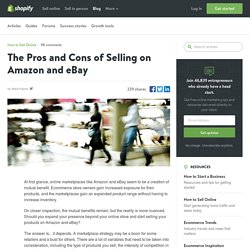
Ecommerce store owners gain increased exposure for their products, and the marketplaces gain an expanded product range without having to increase inventory. On closer inspection, the mutual benefits remain, but the reality is more nuanced. Should you expand your presence beyond your online store and start selling your products on Amazon and eBay? The answer is... it depends. A marketplace strategy may be a boon for some retailers and a bust for others. There are, however, some pros and cons that apply across the board. How to sell on Amazon. Since 2000, Selling on Amazon has been helping individuals and businesses increase sales and reach new customers.
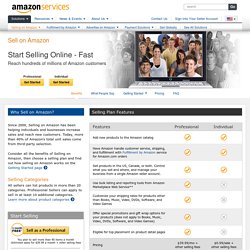
Today, more than 40% of Amazon's total unit sales come from third-party selection. Consider all the benefits of Selling on Amazon, then choose a selling plan and find out how selling on Amazon works on the Getting Started page All sellers can list products in more than 20 categories. Professional Sellers can apply to sell in at least 10 additional categories. Learn more about product categories Start Selling You plan to sell more than 40 items a month Unlimited sales for $39.99 a month + other selling fees You plan to sell fewer than 40 items a month $0.99 per sale + other selling fees Please Note: All new Selling on Amazon subscriptions include access to sell on Amazon.com as well as Amazon.ca. How to make money on Amazon. List your products If a product is already available on Amazon, just add the quantity, condition, and price for your offer.
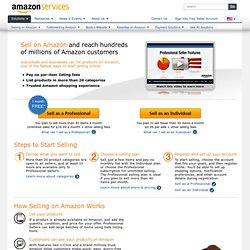
Professional Sellers can add large batches of items using bulk listing tools. Customers can see your products on Amazon With features like 1-Click and a brand millions trust, Amazon helps customers make quick, easy, worry-free purchases. Ship products to customers Amazon notifies you when customers place an order. Get paid Amazon deposits payment into your bank account at regular intervals, and then notifies you that your payment has been sent. "When customers found out they could get free shipping, the lunchboxes began selling like crazy" Kelly Lester, CEO, EasyLunchboxes. Selling on Amazon and eBay - The Pros and Cons - Marketplace Fees, Infrastructure, & Sales.